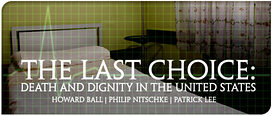Thanks to Howard Ball and Philip Nitschke for this discussion. The central moral question about PAS is whether it is ever morally right to intend the death of an innocent human being. I argued that it is not, on the ground that to do so is to act contrary to the care and respect we should have for each and every person and the intrinsic aspects of their flourishing—the fundamental goods of human persons. A person’s life is not a possession but the person herself; to choose to destroy that person (even oneself), even for the purpose of alleviating that person’s suffering, is immoral. In his reply Howard Ball counters that, “a competent individual who is terminally ill can morally make a decision that life itself is no longer invaluable.” I don’t think Ball gives any support for that statement, but it deserves a reply.
Ball seems to say that while life is sometimes good in itself there are times where a rational individual can rightly conclude (though he uses the word “decide”) that her life has ceased to be in itself valuable. The idea seems to be that one’s life is valuable only if the quality of the total set of future conscious experiences does not fall below a certain threshold. If it does, then one’s life is no longer worthwhile. But I think this reduces back to the position that one’s life is not intrinsically valuable, but is good only as a condition for realizing what is intrinsically valuable, namely, conscious experience. I argued against this in my earlier essay: An individual’s life is the person herself and the person herself cannot be a mere instrumental good.
But perhaps what Ball means is that one’s life is valuable only if one values it—and so if one decides that one’s life is not worthwhile then it isn’t worthwhile. But this, I think, cannot be true. We apprehend that certain conditions are worth pursuing or preserving; we do not decide which are those fundamental, worthwhile goods. One can make a mistake about what is ultimately worthwhile, but that could not be so if it were a matter of decision rather than apprehension. A teenager jilted by his girlfriend may believe his life is not worthwhile, but we see that he is mistaken. In the same way, if an elderly patient demanded that he be killed so that his organs could be used to save others—an attempt to waive his right to life—we would rightly refuse to do so. His life remains inviolable, deserving of respect and care for his own sake, even if he decides it no longer is. Thus, when we see that our life is valuable, it actually is valuable and then we apprehend that it is so; one can’t decide that one’s life is no longer valuable.
Of course, someone might argue that it is okay to intend to destroy that which is intrinsically valuable—an innocent human life for example—in order to avoid bad consequences—in other words, a consequentialist or utilitarian position. The soundness of that ethical theory is a large topic but allow me to address it briefly. Suppose we have a homeless man as a patient in a hospital, that he has no family or friends, and that we could kill him and then by transplanting his organs save six people. Would this be morally justified? Almost everyone agrees this would not be morally right. But it is hard to see why not, if consequentialism were true. Contrary to consequentialism, it seems that some choices, such as intentionally killing a homeless person for the use of his organs, cannot be morally justified by a good end, such as saving six people. In other words, there are some goods one ought not to destroy as a means of realizing other goods or avoiding other evils. The end does not justify the means. Innocent human life is one such good, and this includes one’s own life as well as others’. In my next post I will discuss again the legal issue.

